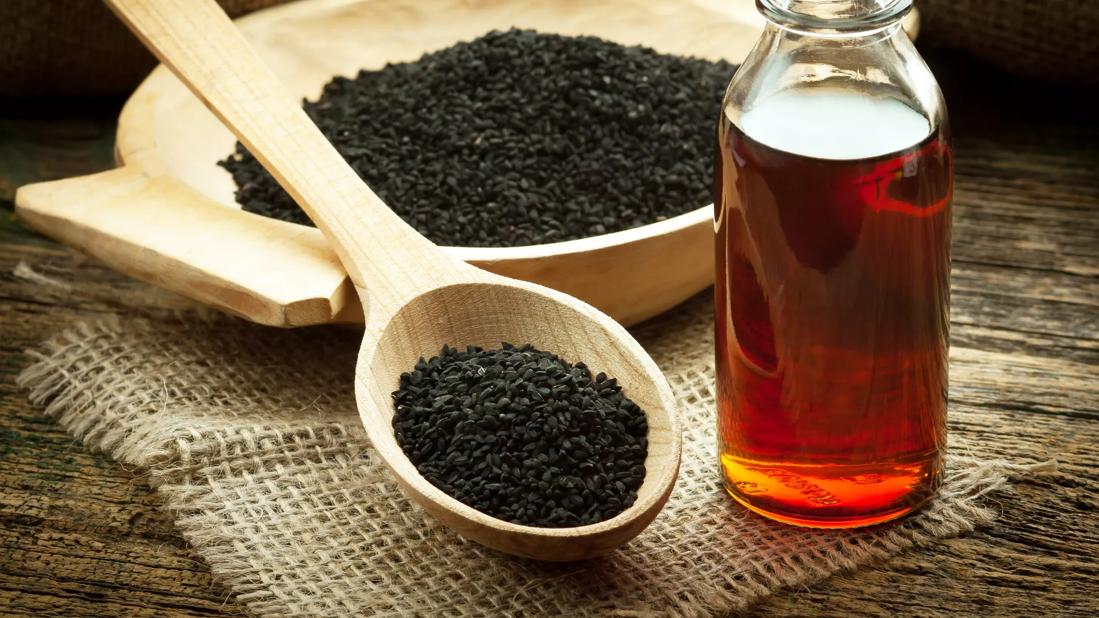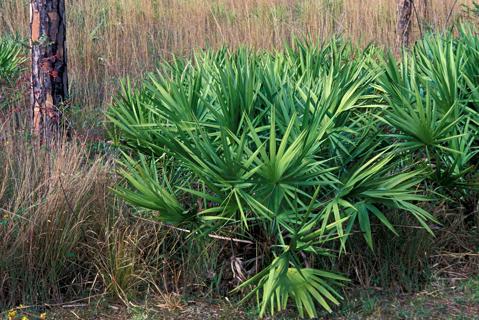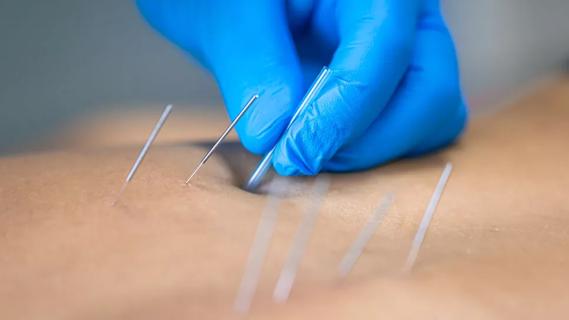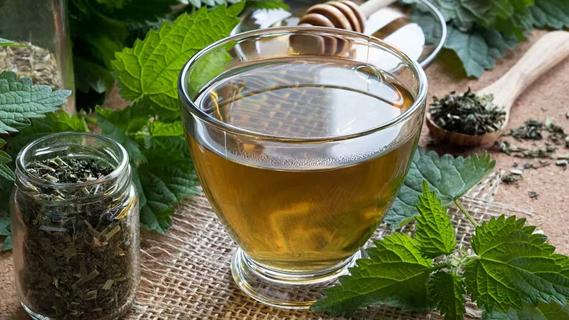Advertisement
Far more research is needed to support the many touted health claims

Black seeds (sometimes called black cumin) are produced by the fruit of an ancient plant called N. Sativa. Medicinal use of these plants dates back thousands of years. They’re even referenced in religious books of Islam and Christianity.
Advertisement
Cleveland Clinic is a non-profit academic medical center. Advertising on our site helps support our mission. We do not endorse non-Cleveland Clinic products or services. Policy
Today, black seed oil extracted from the seeds continues to be touted as a treatment for a variety of wide-ranging health conditions such as acne, arthritis, diabetes and others.
But these claims should be taken with caution. Scientific studies don’t support many of these supposed benefits — and certain people should avoid black seed oil entirely.
Let’s take a closer look with preventive medicine specialist Robert Saper, MD, MPH.
Don’t assume that black seed oil can be a cure-all for certain conditions, says Dr. Saper.
“There’s no robust, rigorous evidence supporting using black seed oil for any specific condition,” he says. “However, there are small studies that raise the possibility of black seed oil being helpful in a number of conditions. Further research is needed.”
Dr. Saper stresses that black seed oil “should never be used in place of conventional medicine for a given condition.” At best, he says, it may serve “as an adjunct to conventional therapy.” In other words, as a companion to medications.
Here’s where black seed oil may be beneficial.
Creams, gels and lotions with black seed oil could help you reduce acne and zap pesky pimples that always seem to pop up at the worst possible times.
Research suggests that black seed oil has antibacterial and anti-inflammatory properties that may help tame acne, notes Dr. Saper. One study showed that a gel with black seed oil reduced acne severity by 78% when used twice a day for 60 days.
Studies also have indicated that black seed oil could have some potential when it comes to addressing skin issues related to:
But further research is needed.
An estimated 400 million people around the world know the sniffling and sneezing that comes with allergic rhinitis (more commonly known as hay fever). It’s the toll of breathing in pollen, mold, animal dander and other allergens.
Black seed oil might offer some hope for relief, says Dr. Saper.
In fact, topical use of black seed oil reduced allergy symptoms in 92% of people with hay fever in one small study published in 2014. Taking black seed oil capsules also have brought positive results.
Black seed oil’s potential ability to reduce inflammation might come in handy if you’re dealing with joint pain from rheumatoid arthritis (RA).
Researchers concluded that black seed oil may be beneficial as an added therapy for people living with RA, says Dr. Saper. But their conclusion followed a very small-scale study with 42 people with arthritis.
Advertisement
The anti-inflammatory effects are connected to a compound in black seed oil called thymoquinone. However, a review of existing studies notes more research is needed to explore thymoquinone’s effectiveness as a medical treatment.
Dr. Saper stresses that given the severe joint destruction rheumatoid arthritis can cause, conventional therapy should always be the mainstay of treatment.
In keeping with the anti-inflammation theme, black seed oil also has shown promise as a complementary treatment for:
Given the serious nature of asthma and how untreated asthma can lead to hospitalization and even death, Dr. Saper emphasizes that conventional controller medications (such as inhaled corticosteroids or montelukast) should serve as the cornerstone of treatment for the condition.
Black seed oil has long been used to lower blood sugar levels and treat diabetes in various parts of the world, including Morocco and Jordan. Scientific research suggests the approach may have some merit.
A review of studies published in 2019 suggests that black seed oil could be used alongside traditional medicines to control diabetes. Again, though, researchers noted the need for more study of its anti-diabetic effects.
Dr. Saper adds that in serious conditions like diabetes where we have excellent scientific data on the effectiveness of dietary change, exercise and a variety of prescription medications, these must be first-line treatments.
Investigators called black seed oil a “safe and promising anticancer agent” after a review of published research, while noting the need for more study. The 2011 report examined studies that looked at the medicinal herb’s potential effectiveness against a dozen types of cancer.
Dr. Saper notes that several successful anti-cancer medications have their roots in nature. Paclitaxel (often sold under the brand name Taxol®) is derived from the Pacific yew tree, for example.
However, the 2011 report should in no way steer people toward only using natural compound treatments when facing a diagnosis of cancer.
“Herbal medicines” like black seed oil may sound tame and naturally good for you, but that doesn’t mean they’re always safe to take. Black seed oil can pose risks to certain people.
Dr. Saper recommends against taking black seed oil if you are:
There have also been case reports of black seed oil use leading to:
Advertisement
Remember this, too: Government oversight of dietary supplements isn’t as stringent as prescription or over-the-counter medications. That makes it difficult to know exactly what you’re getting in quality and concentration.
“Herbal medicines have pharmacologic properties like drugs,” clarifies Dr. Saper. “But they’re different because their side effects happen for many reasons.”
So, if you’re considering taking black seed oil as a supplement, it’s important you talk to a doctor first. The side effects of these supplements aren’t well-documented and can look different for everybody.
Although there’s existing research about black seed oil, more studies and rigorous clinical trials are needed to figure out how (or even if) the supplement should be used to help treat various health concerns.
Is there a reason for some cautious optimism? Sure … but Dr. Saper stresses that black seed oil isn’t a substitute for prescribed medication and many health claims are “disproportionately positive” given the state of current research.
Advertisement
Learn more about our editorial process.
Advertisement

Supplements with colloidal silver offer no proven health benefits and could be harmful

Chamomile, lavender and valerian root teas may offer a faster route to dreamland

Connecting with the Earth and its energy might improve your mental and physical health — but it’s not a cure-all

Research suggests the effect of the supplement, particularly for prostate health, may not deliver believed benefits

Certain seizure medications, HIV treatments, antibiotics or herbal supplements can make your oral contraception less effective

Besides questionable effectiveness, herbal supplements aren’t safe for everyone

Both can help reduce pain, but they’re very different in terms of origins, philosophies and practices

Breastfeeding supplements can be a needless expense at best, and risky at worst

Focus on your body’s metabolic set point by eating healthy foods, making exercise a part of your routine and reducing stress

PFAS chemicals may make life easier — but they aren’t always so easy on the human body

While there’s little risk in trying this hair care treatment, there isn’t much science to back up the claims